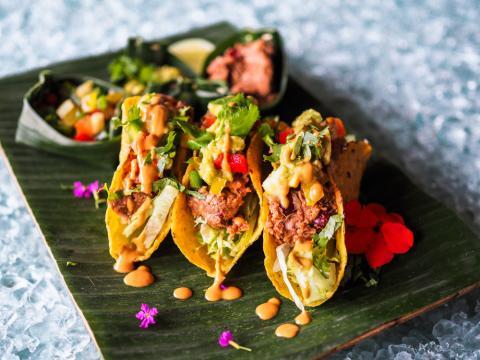
You may not have seen it in the produce aisle yet, but jackfruit is trending: At the end of 2016, Pinterest predicted this Asian fruit would be the biggest food trend of 2017, based on a 420% increase in interest among Pinterest users. Especially if you’re vegetarian or vegan, jackfruit is a multifaceted powerhouse you’ll want to familiarize yourself with.
Jackfruit comes from a tree native to South and Southeast Asia, where it's a common snack and meal component. These enormous fruits, which are actually collections of thousands of small flowers, can grow to be up to 80 lbs., and when ripe, their flesh tastes sweet and tropical. Epicurious reports that in countries such as India, Bangladesh, and Thailand, ripe jackfruit is added to dishes like sticky rice and ice cream.
In America, it's the unripe jackfruit that has gotten all the hype. As a long-time vegan, I’d heard about westerners using young jackfruit as a shredded-meat substitute in tacos and “pulled pork” sandwiches, but since I don’t usually crave meat alternatives, and because I tend to assume that any kind of meat substitute will be challenging to cook with, I hadn’t yet tried it. But recently, jackfruit has been showing up everywhere, and when my mom, also vegan, became interested in trying the suddenly ubiquitous fruit after a friend’s raves regarding jackfruit tacos, I decided to make jackfruit “pulled pork” sandwiches for the two of us.
Because I was completely ignorant about cooking with jackfruit, and because I’m not a confident cook to begin with, I looked for the simplest recipe I could find. Unexpectedly, I easily found one that fit the bill—10 ingredients, very little chopping, and a total prep and cooking time of 30 minutes. Sold.
I stopped by my neighborhood store for the ingredients, including canned green jackfruit, but you can find jackfruit, both ripe and unripe varieties, in many Asian markets. I’ve heard jackfruit has become mainstream, but where I live in California, I couldn’t find jackfruit (canned or fresh) at any chain grocery store except for Trader Joe’s. If you’re new to cooking with the fruit, I’d start with canned versions, as a 25-lb. whole jackfruit can be messy and difficult to work with.
The recipe was as simple as promised, which I have found to be rare. Straight from the can, green jackfruit has a very mild artichoke taste and texture, but the beauty of jackfruit is that it will take on whatever flavors you cook it with. Mine soaked up the BBQ flavor nicely, and it wasn’t too difficult to enhance the shredded texture with a fork while the jackfruit simmered.
My mom and I really enjoyed the resulting sandwiches of “pulled pork” and coleslaw (we made ours vegan by using vegan mayo). I don’t remember what pork tastes like, but neither my mom nor I thought the jackfruit would fool a meat-eater. Still, it was delicious and a great way to enjoy classic flavors that I don’t taste regularly as a vegan.
Health Benefits of Jackfruit
Jackfruit’s profile on the USDA database indicates that the fruit provides numerous nutritional benefits. It’s high in fiber, which is good for colon health and expelling toxins from the body, and it’s a moderate source of protein (a cup of jackfruit provides about 6% of your daily needs). With antioxidants and 38% of your daily dietary needs of vitamin C, jackfruit is a tasty way to strengthen your immune system, and its potassium content helps stabilize electrolyte levels and can aid in reducing blood pressure. A cup meets about 15.4% of magnesium needs, important for various reactions in the body including protein synthesis, muscle and nerve function, and energy production. Jackfruit also has significant levels of vitamins A and B6, manganese, and zinc.
What truly makes jackfruit a powerhouse plant is that every part of the tree is usable—the Epicurian article notes that the seeds can make a tasty roasted snack or be ground into flour, and that the timber from the tree is sturdy enough for use in furniture and instruments. An interesting article in The Guardian posits that since jackfruit grows in tropical climates, it will become an increasingly important crop as the climate gets warmer and staples like wheat and corn are harder to grow.
I will definitely buy jackfruit again, especially the easy-to-use canned variety, to add a meaty texture to tacos, curries, and enchiladas. I’m especially looking forward to trying this recipe for vegan jackfruit ice cream!
* Disclaimer: Author has no financial affiliation with the brands and products mentioned.








